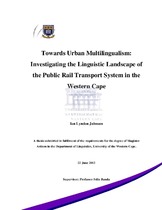Towards urban multilingualism: investigating the linguistic landscape of the public rail transport system in the Western Cape
Abstract
This study explores the linguistic landscape of Metrorail in the Western Cape, South
Africa. The Western Cape is a diverse, multicultural society with a history of
colonialism and imperialism. For this reason, the language/s on signage was explored to reveal differences/similarities between the various groups and cultures within society.This kind of investigation entailed consideration of the signage displayed on trains,stations and other railway infrastructure. Thus, data was collected over a three-month period during 2010 which coincided with the FIFA Soccer World Cup, hosted by South Africa. A combined quantitative and qualitative approach for the analysis of data was supplemented with a multimodal, multi-semiotic approach. In addition, interviews were conducted of a cross-section of commuters as a way to give meaning to the analysis of the quantitative and qualitative data. The analysis explored the extent to which multilingualism and multiculturalism are reflected in the linguistic landscape of Metrorail.The focus of the study was on the degree of visibility of the official and non-official languages on signage, as faced by Metrorail commuters. The findings of the study reveal
that the interplay between power relations, prestige, symbolic value, identity and vitality in the linguistic landscape of Metrorail results in a somewhat limited display of multilingualism. The findings also reflect the changed language attitudes and
perceptions, the maintenance of power relations, the expression of identity, and the
desire to be perceived in a certain way, in a broader South African context. Furthermore,the data reveals that the actual linguistic reality does not accurately reflect the aims of the Western Cape language policy in terms of promoting multilingualism. Moreover, it reveals that English is the preferred language of wider communication and it is also the dominant language on the official and non-official signage in the public space. Although the indigenous African languages, along with Afrikaans, are generally neglected in the public space, these languages are widely spoken by Metrorail commuters. The linguistic landscape of Metrorail therefore does not accurately reflect the linguistic reality of the various speech communities in the Western Cape. The linguistic landscape of Metrorail serves to index the broader social developments of the transformed sociolinguistic South African identity.

